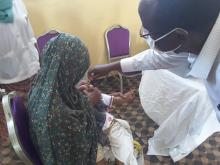Ethiopia conducts polio vaccination campaigns to ensure the country remains polio free
In November 2020, Ethiopia conducted an oral polio vaccination campaign targeting 7.1 million under-5 children in four regions and two city administrations despite the challenges posed by the COVID-19 pandemic. The campaign was conducted in Harari, Oromia, SNNP and Somali regions, and Addis Ababa and Dire Dawa cities. This campaign, which attained 103% of the targeted coverage, was the second-round of a polio vaccination campaign that was conducted in October 2020 also targeting 7.1 million children under-five years in the same locations and attaining 97% coverage. Monovalent type 2 oral polio vaccines were used in both campaigns.
While the WHO African Region was certified as wild poliovirus free in August 2020, heralding the elimination of the virus from the region, governments, WHO and partners remain vigilant for any importation from areas that haven’t yet eliminated the disease. Heeding this caution, the Ethiopian Ministry of Health embarked on the two rounds of polio vaccination campaigns to ensure children in these areas are protected from paralysis due to polio virus strains caused by inadequate access to immunization services. In addition to dwellers of cities with international gateways, the campaign focused on internally displaced people, pastoralists and hard-to-reach border communities.
“As we battle the COVID-19 pandemic, we must also ensure that essential health services such as routine immunization as well as vaccination campaigns continue without interruption. We must continue provision of these services while protecting health workers and service seekers,” said Dr Boureima Hama Sambo WHO Representative to Ethiopia. “The excellent coordination of the polio and COVID-19 incident management teams in these campaigns was commendable.”
Due consideration was given to the unique circumstances under which the campaigns were conducted, and vaccinators received specific orientation on protecting themselves and communities from exposure to COVID-19 during the campaign. All vaccinators and supervisors wore masks at all times and sanitized their hands with an alcohol-based hand sanitizer after every drop of vaccine. They also used the opportunity to convey COVID-19 prevention messages to the communities they visited and worked with.
WHO, UNICEF, CDC, the Bill and Melinda Gates Foundation and other immunization partners supported the Ministry of Health and regional health bureaus in the preparation and conduct of both rounds of the polio vaccination campaign. WHO provided technical leadership and financial support from planning to the conduct of the campaign, and also provided full logistical support, which was crucial to the success of the campaigns.
Campaign quality was assured through use of the innovative Open Data Kit (ODK) platforms installed on smartphones of supervisors for monitoring and supervision. In addition to direct supervision of vaccination teams comprising nurses, health extensions workers and community volunteers, WHO teams were also involved in facilitating the recruitment, training and deployment of independent monitors and surveyors for validating the quality of the campaign coverage and its processes. At the launch of the first-round campaign, WHO and UNICEF undertook sensitization and community mobilization activities to ensure maximum uptake of the vaccine.
WHO and immunization partners remain committed to work with the Ethiopian Ministry of Health and regional health bureaus to maintain the successes gained in the elimination of wild poliovirus from Ethiopia and Africa.
===
For more information, contact:
Loza Mesfin Tesfaye
Senior Communications Officer
WHO Ethiopia
e-mail: tesfayel [at] who.int
phone: +251 911 144 194 (Direct, Whatsapp)
